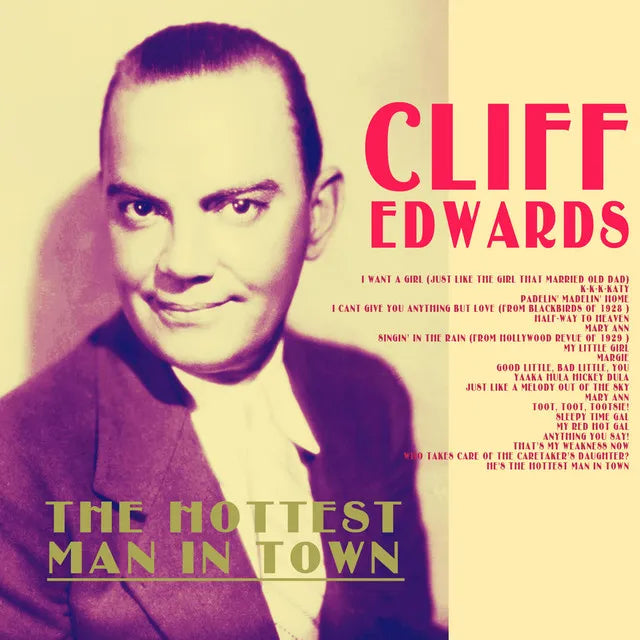Cliff Edwards Biography
Who is Cliff Edwards? A Brief Career Overview
Clifton Avon "Cliff" Edwards, affectionately known as "Ukulele Ike," is a musical treasure from the American entertainment scene, particularly remembered for his cheery tenor vocals and the joyful strumming of his ukulele. A multi-talented artist, he shined as a singer, actor, and voice actor, primarily associated with the genre of movie tunes. Cliff's impact on the music industry is undeniable: he sold over 74 million records, contributed to the golden age of Broadway, and lent his voice to beloved characters in classic Disney films. His most iconic role as Jiminy Cricket in Disney's Pinocchio (1940), where he sang the timeless classic "When You Wish Upon a Star," cemented his legacy in both music and animation. This heartfelt connection to vinyl culture is showcased through his extensive discography, making him a cherished figure among vinyl collectors and music enthusiasts alike.
Cliff Edwards's Early Life and Background
Born on June 14, 1895, in Hannibal, Missouri, Cliff Edwards was raised in a modest household, where music became a source of joy amidst life's challenges. After leaving school at age 14, he ventured to St. Louis to chase his dreams of performance. It was there he discovered his passion for the ukulele, choosing the instrument for its affordability. Cliff's early exposure to music was rich with cultural influences that sparked his imagination and motivated him to entertain others. His first performances as a singer in local saloons and his early fascination with novelty songs laid the groundwork for his future success in conveying joy through his music--a sentiment that resonated beautifully when pressed onto vinyl.
The Musical Influences That Shaped Cliff Edwards's Sound
Cliff Edwards drew inspiration from a variety of musical sources that helped shape his unique sound--a delightful blend of jazz, pop, and novelty tunes. He admired the works of great composers and performers, including George Gershwin and Al Jolson, and his own contributions to iconic songs like "Fascinating Rhythm" and "Toot, Toot, Tootsie! (Goodbye)" are reflective of these influences. Edwards' early collection of jazz records and performance styles inspired by vaudeville also played a pivotal role in forming his signature playful sound. The influence of pioneering vinyl recordings helped ignite his desire to create and contribute to the evolving music scene of the early 20th century.
How Cliff Edwards Entered the Music Industry
Cliff Edwards' pursuit of a music career started humbly. What began as an adventurous hobby turned into a serious passion when he started performing at local venues and collaborating with other artists in St. Louis during his teenage years. His career officially kicked off in 1919 when he made his first phonograph records, establishing himself as an entertainer in the burgeoning recording industry. Edwards faced various challenges, from limited resources for producing vinyl records to the fierce competition of other recording artists. However, with remarkable resilience, he eventually signed with Pathe Records in 1923 and achieved significant breakthroughs, including chart hits that allowed him to press vinyl records, ultimately laying the foundation for a successful career.
Cliff Edwards's Breakthrough and Rise to Fame
Cliff Edwards' rise to fame was punctuated by several pivotal moments, the most notable being his recording of "Singin' in the Rain," a track that not only topped charts but also became a cultural phenomenon. Released in 1929, its popularity skyrocketed, leading to critical acclaim and widespread recognition, particularly for its vibrant vinyl pressings that collectors sought after. Following this success, Edwards found himself in the spotlight, headlining at venues like the Palace Theater in New York and receiving accolades for his vibrant performances. His film roles, particularly as Jiminy Cricket, further propelled his career, allowing him to capture the hearts of audiences, solidifying his legacy in the annals of music history.
How Personal Life Shaped Cliff Edwards's Music
Cliff Edwards' personal journey was marked by both triumphs and tribulations, all of which influenced his creative expression. Struggling with addiction and financial instability, Edwards channeled his challenges into his music, often embracing themes of resilience and hope. Significant relationships, including his tumultuous marriages and his connection with the entertainment industry, shaped his worldview and inspired poignant lyrics in his songs. Furthermore, his philanthropy work and commitment to supporting others struggling with similar battles demonstrate his compassion and commitment to bettering those around him. Despite the adversities he faced, Edwards' tenacity and creativity sparkled through, leaving an indelible mark on his artistic output.


























